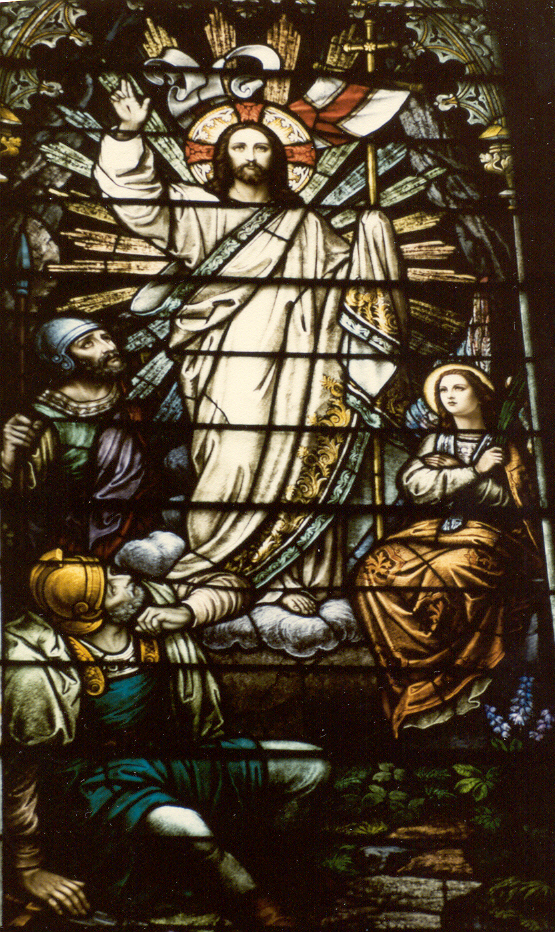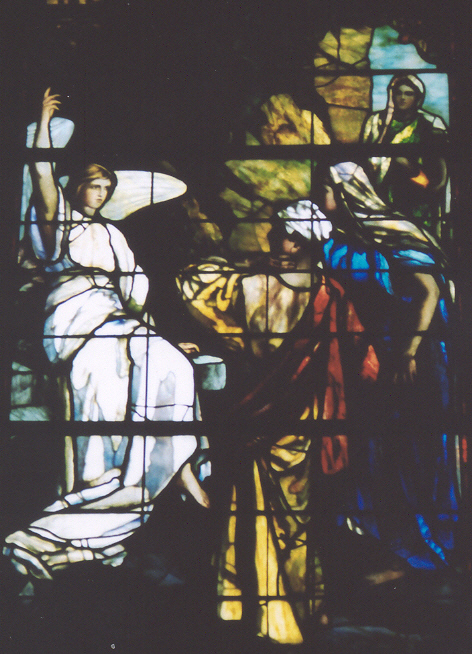
Easter Sunday
A Homily - B Cycle - 2002-2003
First Reading - Acts 10:3-4a, 37-43
Psalm - 118: 1-2, 16-17, 22-23
Second Reading - Colossians 3:1-4
or I Corinthians 5:6b-8
Gospel - John 20:1-9
John wrote to show that Christ was
the Messiah, the Divine Son of God.

On the first day of the week, Mary of Magdala came to the tomb early in the morning, while it was still dark, and saw the stone removed from the tomb. So she ran and went to Simon Peter and to the other disciple whom Jesus loved, and told them, "They have taken the Lord from the tomb, and we don't know where they put him." So Peter and the other disciple went out and came to the tomb. They both ran, but the other disciple ran faster than Peter and arrived at the tomb first; he bent down and saw the burial cloths there, but did not go in. When Simon Peter arrived after him, he went into the tomb and saw the burial cloths there, and the cloth that had covered his head, not with the burial cloths but rolled up in a separate place. Then the other disciple also went in, the one who had arrived at the tomb first, and he saw and believed. For they did not yet understand the Scripture that he had to rise from the dead.
Our celebration of the Resurrection this morning is one of the highlights of the liturgical year and our entire parish staff extends a special welcome to all of our guests, both Catholic and non-Catholic alike. Believer or not, the Resurrection certainly speaks to all peoples of all times.
The Resurrection is one of the central mysteries of our Catholic faith. Without the Resurrection, St. Paul tells us that our faith is in vain and that our Lord's life, which ended at Calvary is but a tragic end to a seemingly promising preaching career that our Lord enjoyed until popular opinion turned against Him. We recalled these events in the liturgies we celebrated this past Holy Week.
As sons and daughters of the Resurrection, however, we know that Good Friday was not the end of the story. Today's solemnity is the very reason why everything that our blessed Lord did and said in those three years of public ministry actually makes sense. Our Lord proves that as the Son of God, He has conquered even that which seemed insurmountable - death itself. Over 2,000 years removed from the actual event, we should still marvel at what the Resurrection means - to conquer death and to never die again - absolutely amazing - literally, an earth-shaking reality. This is the Christians' hope - it is why the Christian lives in the way that He does everyday - not viewing the Resurrection as some sentimental, past historical event but rather - a pledge of future glory for those who remain faithful and obedient in humility to the end. If you've ever been to a Catholic funeral, you know that it is the Resurrection that animates our belief that heaven is attainable.

This morning, I would like for us to consider the last line of today's Gospel taken from St. John's account. It reads, "For they did not yet understand the Scripture that He had to rise from the dead." The Apostles didn't understand this and neither do many Catholics. So, we ask ourselves, "What does the Resurrection really mean? What happened and why should this cause us to change the way we live - to seek interior conversion and purification to turn back to God?"
Like the apostles before us, we too have somewhat of an incomplete understanding of what Resurrection really means. On one level, the Resurrection is both proof of our Lord's divinity and a pledge of future glory. The Resurrection is proof of Christ's divinity because only God could lay down His life AND take it up again. The Resurrection is also a pledge of what each of us should expect if we are faithful to the Lord and obedient to His teachings in all things as they have been handed down in the Church through the very Apostles who first saw the Resurrection and their successors, the bishops. St. Peter says as much in our first reading from the Acts of the Apostles. He notes that Jesus rose from the dead and appeared first to the Apostles, who were then commissioned to preach and testify that Christ has been appointed by God to be judge over the living and the dead. In our Lord's divine wisdom, He clearly selected the Apostles to be the first persons to see evidence of the Resurrection. In our Gospel today, we observe that while Mary Magdalene is the first to arrive at the tomb, it is Peter and John who are the first to examine the evidence that Christ had been Resurrected.
So, what really happened on that first Easter Sunday morning? Part of the answer is found in our Gospel reading. You may have noticed that St. John devotes such painstaking detail to the status of the burial cloths and the cloth that covered our Lord's head in the tomb? The original Greek reveals much more about the status of the burial cloths. In Greek, the words used to describe the condition of the burial cloths suggest that the linens were deflated or flattened, not pushed aside like a person does to their blanket and comforter when they wake-up in the morning. Rather, the Greek suggests that our Lord passed right through the linens. This would happen again on Easter Sunday night when our Lord would pass through the locked doors of the upper room where the Apostles were hiding for fear of the Jews.
We also read that the cloth that covered our Lord's head was rolled up in a separate place. In Greek, this cloth's condition proves that our Lord's body was not stolen, because removing ointment-laden linens stuck to the head would have been difficult to remove and thieves would not have taken the time to care for the status of the facial cloth in this way.

The condition of the burial cloths and the cloth that covered our Lord's head must have made such an impression of St. John that he chose to include details of it in his Gospel. Their status suggests that the Resurrection transcends all the laws of nature such that our Lord passed right through the burial cloths - the shroud. To repeat what I said in a homily some weeks ago, Resurrection is not the same phenomenon as what happened to Lazarus who was raised from the dead. Unlike the Resurrected Christ, who would never die again, Lazarus would surely experience death a second time. Unlike the Resurrected Christ who passes through the linen burial cloths, Lazarus would have to be unbound of his bandages.
The Resurrection enters an entirely new dimension of existence. A resurrected body is a glorified body, capable of passing through walls and doors; not subject to disease or death; a body that enjoys a certain glow and total perfection.
In this single event of the Resurrection, Christ's human body and human soul are reunited. And so, we believe that at the final judgment, cemeteries will be very busy places because every human body will be reconstituted in a glorified state and rejoined to the soul that once animated it to either enjoy the eternal bliss of heaven or the eternal fires of hell.
While we have evidence of an empty tomb and eye-witnesses, the Resurrection is still a matter of faith for it reveals a level of existence well-beyond ordinary human comprehension. The gift of faith is needed in order to begin to scratch the surface of what this mystery really means. Some of you may have seen in the news in the last couple of days how the Holy Father, Pope John Paul II has celebrated the Triduum. The Easter Sunday Mass at St. Peter's is always such a majestic affair, with all the glory of the architecture and the pageantry of the Mass. Perhaps it is worth looking at all of this ceremony and the grand Basilica that serves as it's backdrop as living testimony that Peter's martyrdom in Rome so many years ago is a proof that the Resurrection happened - after all, Peter himself saw and conversed with our Resurrected Lord. Peter's faith led him to give his life as a martyr because he knew he was assured of the Resurrection so long as he remained faithful to the end.
Peter is the main character in our first reading today taken from the Acts of the Apostles. Here, we learn of St. Peter's evangelization of the Gentiles - it is his first speech to non-Jews, more that 50 days after Easter. How different the tone in Peter's voice. Just three days ago, we read about how he denied our Lord three times after he practically swore that he would never do such a thing. Peter, now imbued with the gifts of the Holy Spirit, courageously preaches the truth.
As we renew our baptismal promises this day, may we each raise the bar of our moral life. If we have been away from the sacraments and the Church, now is the time to return to the Sacrament of Penance and then the Sacrament of the Eucharist. If we've been struggling with Church teaching, now is the time to seek out a priest who can guide us back to the Father's house. The Resurrection demands as much for we each have a mighty dignity to uphold as sons and daughters of the risen Lord - a dignity once marred by Adam and Eve, but now healed and restored by our Lord at Calvary and brought to perfection and completion at the Resurrection. May each of us make the words of the liturgy our very own today when we joyfully exclaim that indeed - Christ has died, Christ has risen, Christ will come again!
Praised be Jesus Christ! Now and forever!